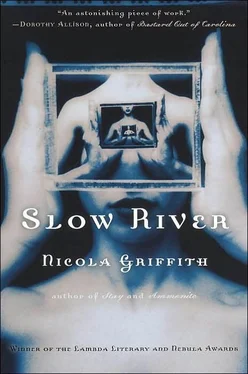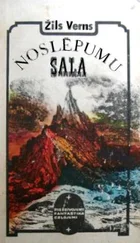“Yes.”
She could have left me that night in the rain, just pretended not to hear me, and walked away. I could have died.
“All right, then. Tomorrow.”
We didn’t shake hands.
It was raining, but I didn’t feel it. I was wrapped in plasthene hood, long coat, booties over my boots, hands sprayed with a transparent layer of plaskin. I crouched on the pavement, shielding the open pack with the waterproof coat. Spanner cursed in the darkness. I waited. The switching station’s lock was standard design; it should not be too hard. Not usually. I could feel words welling up my gullet like fish on a rising tide: Let’s go back. It’s not too late to change our minds… But then the lock clicked, and Spanner slid the door open, and I was handing her one pack and carrying the other inside. I pulled the door shut. It was pitch black until I found the lights.
The station was ten feet square and low-roofed. Digital relays switched soundlessly, lightlessly. It was cold. There was one chair on casters. The floor was smoothed concrete. We shook ourselves to get rid of the worst of the rain, but didn’t dare take off the coats. We were clean for this job: no stray skin or hair for the security snoops to read for DNA.
“Do you want the chair?” I asked.
Spanner was already unfastening her tool roll. She shook her head.
The stillness and silence were unnerving. “Why aren’t there any console lights?”
Spanner reached up and touched something and then there were soft reds and ambers and greens, an occasional pink and turquoise.
I unfastened my own pack and began handing Spanner things one by one: the disk that had taken me hundreds of hours to put together; the matte, featureless box that had cost so much; a flatscreen; connectors… Spanner had spent hours earlier, cleaning everything with ultrasonics where she could, a toothbrush where she couldn’t. No stray hairs or skin or oil to be left behind for analysis. I sat back and watched her work.
With tools in her hand and a job to do, she was transformed. Each gesture was gentle, precise as she set up the diagnostic flatscreen watched the waveforms, nodded, reached for her tone pad. I remembered those hands touching my back, the spaces between my ribs, stroking. I remembered the whites around her eyes, the way she had trembled with the effort of not moving, not jarring her dislocated joints before the medic came.
I swallowed convulsively.
She pushed the disk into its drive, watched the screen, frowned, sucked air through her teeth.
“Trouble?”
“Um? No. Take a few minutes.”
I was distracting her. It was time I prepared myself for my part.
The access window was flat to the wall behind and to the right of Spanner. I pushed the chair until it was opposite, then sat down with a board on my lap. I thumbed it on, maneuvered myself and the chair until the green ALIGNED panel lit up. All the other panels came up amber one by one: the station’s security systems were all online, doing their job, checking and rechecking access. They would flash red one by one as Spanner piggybacked the net signal, but we had a program to override the alarms at source. As long as the human overseer did not check during the dozen or so seconds we were working the signal, we should be fine. And according to the information bought along with the hardware, they shouldn’t check. But they might.
There was no way to know whether or not the program would do what its writers claimed; there was no way to make sure the handshake box would successfully mimic the net’s signal, which was changed on a random basis. Spanner had looked over the code—I had even taken a look—and as far as we could see it was the real thing, but there was only one way to be certain.
I looked over at Spanner. She was working smoothly. A soft tone seeped through the room. “Box has the handshake,” she said. “Now we just wait.” She reached up and turned on the station screen.
The schedules had listed a rerun of an old, fashionably cult-status sitcom on the assigned channel, and the net was nothing if not efficient. Nevertheless, I found myself breathing hard with relief when the star appeared with her trademark grin. If that was as planned, maybe everything else would go smoothly. I wondered what people would be watching on the demand channels: films, live sports, live sex, dog shows, cartoons…
“Commercials in two minutes eleven seconds.”
Usually, commercials were tailored for the viewing audience, but we were going to hit everyone with the same thing. As Spanner had said, “Look, we may be going after the rich and stupid, but the kind of people who regularly watch the net at four in the morning—the depressed, the sleepless, the drunk, people who’ve been up fucking their new love all night—we can pull them in, too.” What she meant, of course, was: Let’s take from the defenseless, the ones who don’t really have anything to give, or who will give to anything because they are about to end their lives.
“Hope the damn handshake doesn’t change in the middle of the commercial,” she muttered. I didn’t ask what would happen if it did. I didn’t want to know.
“Is the account program online?”
“Yes. Commercial in fifty seconds.”
My hands were tight on the board, going purply white at the joints. We were going to wait until the end of the first advertisement; probably thirty seconds. At that point there was less chance of the security snoop noticing—they weren’t paid to guard the advert signal. We had no idea what the commercials might be, but Spanner had watched dozens of the most likely candidates, and written interrupt programs for them. If it was something we didn’t recognize, though, she would have to do it by hand.
“Twenty seconds. Nineteen. Eighteen. Seventeen…”
My board was amber all the way.
“We’re synchronized.” We would ride silently for a few seconds.
Still amber. “All clear.”
“Four seconds. Three. Two. One.”
The screen cut to a brilliant green. “This is—” and Spanner swore. The screen suddenly dulled to brown and red: the ruined floor of what had once been rain forest.
“What’s happening, what’s happening?
“Minimercial,” Spanner said briefly. “They’ll take the whole commercial spot.”
We had less than three minutes to decide what to do. “Board’s amber.”
“And the signal’s very sweet,” Spanner said. “I’m going to do it.” Her voice was sharp, decisive. “I’ll cut in when it’s done. Steal program time.”
“You know this commercial.”
“No, but a windup’s a windup.”
She was right. You could always tell the last few seconds of an ad. “Do it,” I said.
It was dangerous, much more dangerous than we had planned. Viewers never timed adverts, but after years of always getting the same number of seconds their bodies would be tuned to it. Inside, they would think, Hey, there are a lot of ads today… And maybe one of those viewers would be the security snoop. Maybe he or she would be fast, would flip the trace before we cut.
“Here’s the windup.”
“All clear.” No going back now. If the drugs had affected Spanner in the slightest, if she made one millisecond’s mistake, the cut would be obvious. Adrenaline tightened the muscles around my eyes; my breathing got shallow.
She was perfect. The white lettering faded out and then in to the bright red and yellow that was the first frame close-up of Tom’s tie.
I looked at the board. “Ten-percent red. Twenty.” The security program had started to trace our signal. It wouldn’t find us until the whole board lit.
“Come on, you babies, come on,” Spanner muttered. I wondered what the account program was telling her.
“Twenty-five percent. Fifty!” The sudden flicker of red across the board made my heart leap sideways. “Seventy!”
Читать дальше












